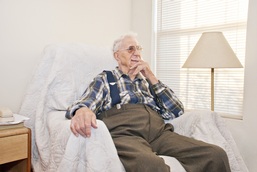No excuses for bad care despite challenging times, states CQC
Care Quality Commission (CQC) chief executive David Behan has committed the regulator to ‘calling time on unacceptable inadequate care’, pointing out that many financially challenged organisations have nevertheless achieved good or outstanding care services.

This commitment comes as England’s care regulator publishes its fifth annual report on the state of health and care services, within which much excellent care is praised although ‘variation in the quality and safety of care’ is singled out as a key concern.
State of Care
Mr Behan commented on the report: “We have seen some excellent care in all sectors. For example the Accident & Emergency team that worked with patients to identify their support needs and meet those needs in the community, reducing the number of patients needing to be admitted to hospital. Or the care home where we saw how supporting people living with dementia was built into each care plan.
“In primary care, we saw an out-of-hours GP service that had a system to quickly identify and respond to the needs of people who had long-term conditions, complex needs and those needing end of life care, who received a call back from a duty doctor within 20 minutes or home visit within two hours.”
“But we have also seen very poor care,” he continues, “such as the care home that inspectors found smelling of urine and where residents were still in bed at 10.30am, with many not getting the help they needed to eat breakfast. In one hospital we found that patients who had undergone surgery were being cared for in the recovery area for extended lengths of time. Patients were being returned to clinical areas that were inappropriate given the complexity of their needs.
“Our inspections have also found variation within services. For example, while most hospitals are rated at least good for the way they care for people, the majority require improvement when it comes to keeping people safe.”
Outlining the regulator’s future commitments, he says: “While we will celebrate good and outstanding care where we find it, we are calling time on unacceptable inadequate care. When our inspections identify poor care, they must lead to improvement by providers, who should learn from the good and outstanding care we champion through our new ratings.”
Addressing the funding issues within the industry, Mr Behan dismisses the notion that these can be blamed for poor care occurring.
“We acknowledge the rising pressure on care services. Financial pressures are real but not unexpected, and yet we continue to see many examples of good and outstanding care even in financially challenged organisations.
“Understanding the quality of care is complex – it is about how people experience services, it is about the outcomes of the services and about how safe they are. Quality and safety is underpinned and influenced by the quality of the leadership and the culture that the leadership creates within a provider. We have found in our new more rigorous inspections that being well-led promotes quality and safety overall.
“From our inspections, the safety of services is our biggest concern. Care providers must make the basics of safe care a priority and build a culture of safety in their organisations, learning from the best. The principle of keeping people safe from harm is fundamental. Strong, effective leadership at all levels in an organisation is vital. Our new inspections have found that good leadership drives up quality and safety overall.”
For those services that still require improvement, the CQC asks that providers place public need at the heart of all care practice and encourage a learning culture within their professional teams.
LGA response

A spokesman from the Local Government Association (LGA) commented: “Councils work closely with local care providers to try to continuously improve services for people who rely on care and their carers.
“We know that more still needs to be done. We want all people who need care and support to have access to the best quality, safe services whether they are in a care home or a hospital so they can return home sooner and live safely in the community for longer. To do this, councils and health partners need to work with providers to ensure that well supported and trained staff are working to put people at the centre of decisions about their needs and support.
“In the period of the current Parliament, local government funding has been cut by 40 per cent and councils will have to have made £20 billion worth of savings. As a result, councils have had to reduce adult social care budgets by more than £3.5 billion since 2010. So far, services have been protected as much as possible, but this is becoming an increasing challenge for councils in the face of growing cuts.”
More perspectives
Jane Harris, campaigns director at Leonard Cheshire, called for a strong response from local councils, saying: “The Care Quality Commission is right to highlight how much care varies around the country. People should expect basic standards of care wherever they live and no-one should suffer the indignity of 15-minute care visits.
“Every day thousands of disabled and older people are being forced to choose between having a cup of tea and going to the toilet.
“Some good councils have taken the right step and reviewed the number of 15-minute visits they buy. But councils across the country need to follow their lead so we can have a care system that is fair to all.”
George McNamara, head of policy and public affairs at Alzheimer’s Society, also said: “It is unacceptable that many people with dementia experience poor care in this day and age. There is a huge human and economic cost to unsafe care. Whilst much of the cost of poor care falls on families trying to ensure their loved ones are cared for, the taxpayer has to pick up the pieces too.
“With one person developing dementia every three minutes we need to be investing more in care to keep people in their own homes and out of hospital. We also need a culture that places the person at the centre of their care and ensures all staff are dementia aware in order to move the idea of a system without poor care beyond rhetoric and into reality.”
Latest News Analysis
 04-Sep-19
Extra £1.5 billion announced for social care in Chancellor's Spending Review
04-Sep-19
Extra £1.5 billion announced for social care in Chancellor's Spending Review
 02-Jul-19
Department of Health forced to rethink care homes' nursing rates after legal challenge
02-Jul-19
Department of Health forced to rethink care homes' nursing rates after legal challenge
 18-Jun-19
Overnight care workers forced to sleep in offices and told 'bring your own bedding'
18-Jun-19
Overnight care workers forced to sleep in offices and told 'bring your own bedding'
 14-Jun-19
Back in the closet: Third of care home staff have had no LGBT+ awareness training
14-Jun-19
Back in the closet: Third of care home staff have had no LGBT+ awareness training
 11-Jun-19
PM candidates on social care: Rory Stewart calls fixing care an 'unfinished revolution'
11-Jun-19
PM candidates on social care: Rory Stewart calls fixing care an 'unfinished revolution'